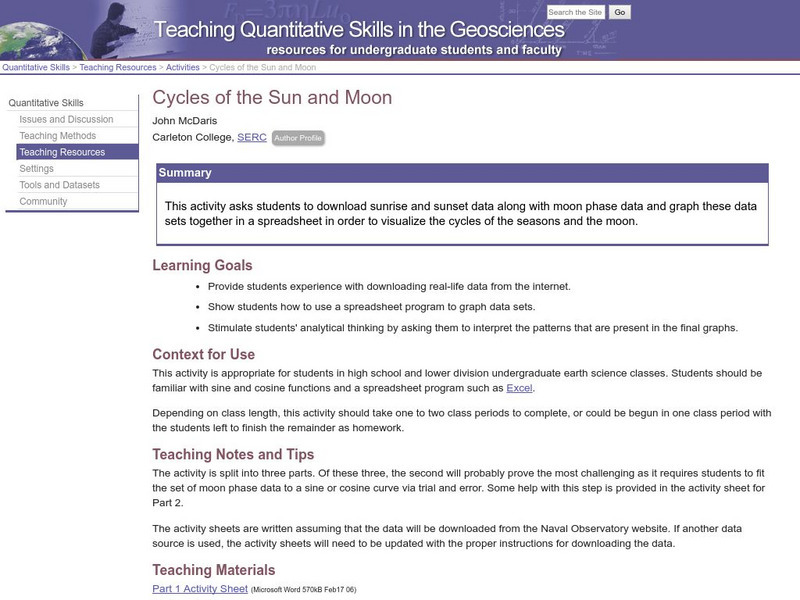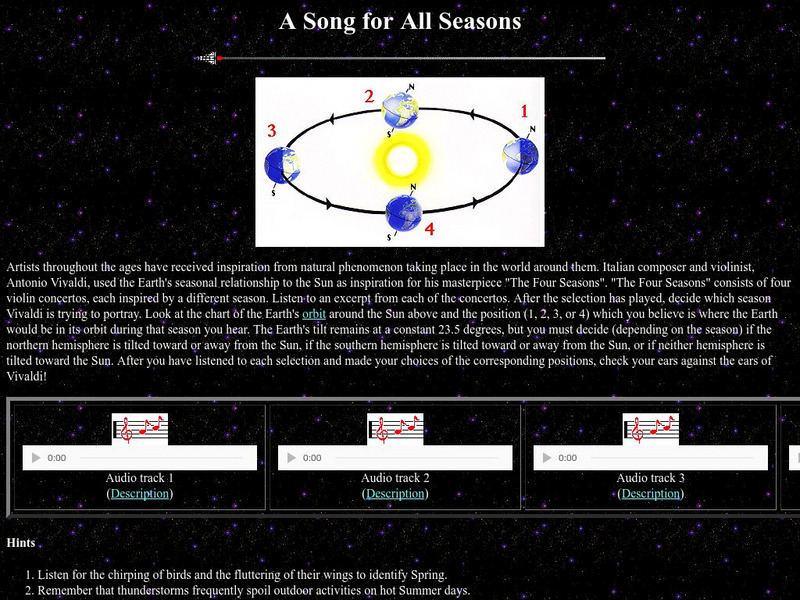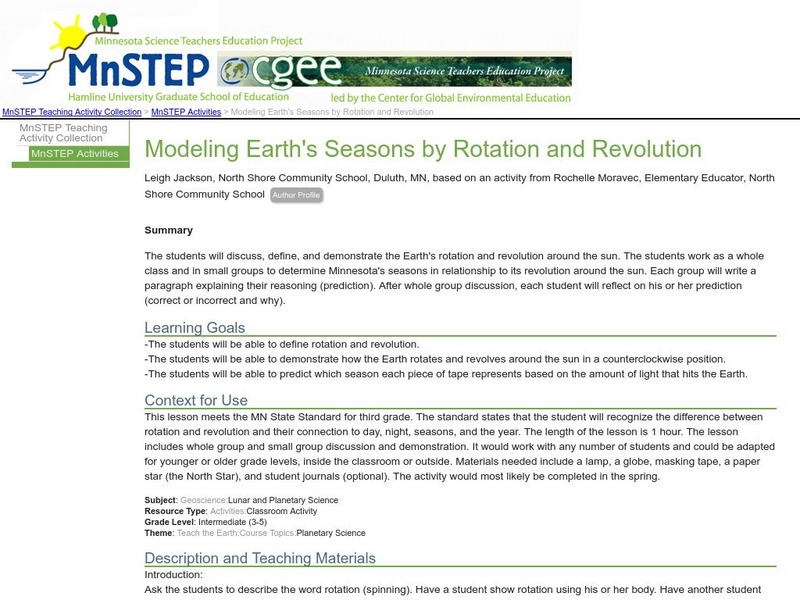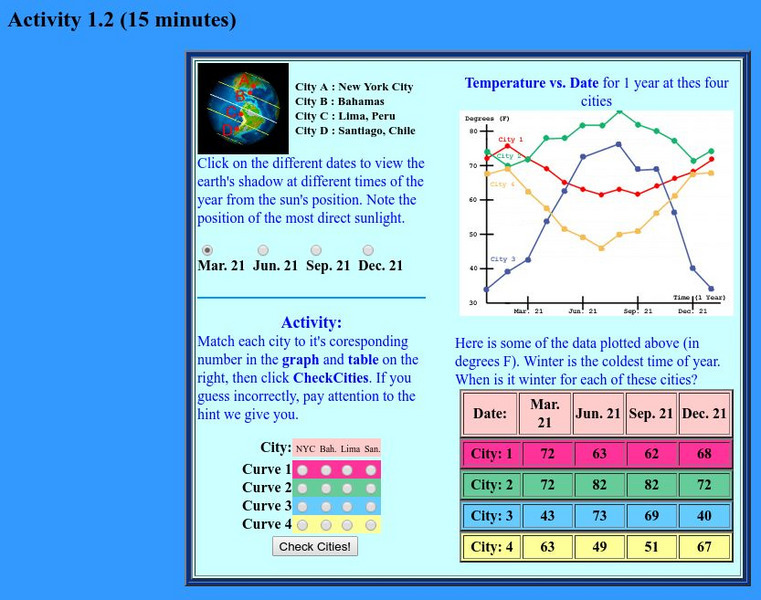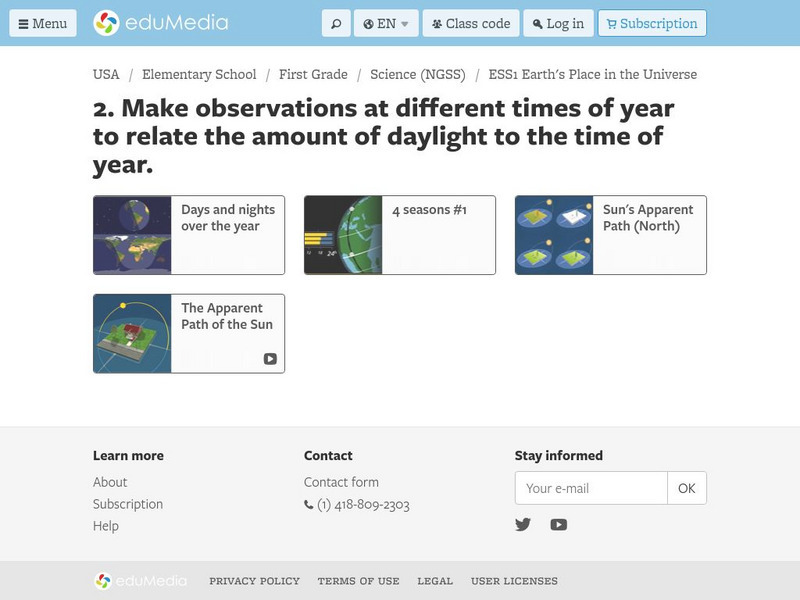Science Education Resource Center at Carleton College
Serc: Calculating the Declination of the Sun for Elementary Students
In the school courtyard, young scholars will measure the apparent path of the sun across the sky using a toilet plunger. Students will then generate questions as to why the sun appears to move, and what is really happening in the...
The Wonder of Science
The Wonder of Science: Ms Ess1 1: Earth Sun Moon System
Develop and use a model of the earth-sun-moon system to describe the cyclic patterns of lunar phases, eclipses of the sun and moon, and seasons.
Science Education Resource Center at Carleton College
Serc: Cycles of the Sun and Moon
Students download sunrise and sunset data along with moon phase data, and graph these data sets together in a spreadsheet in order to visualize the cycles of the seasons and the moon.
NASA
Nasa Star Child: A Song for All Seasons
After listening to excerpts from four of the violin concertos from "The Four Seasons" by Italian composer and violinist, Antonio Vivaldi, decide which excerpt was meant to go with which season, and also decide where the earth would be in...
PBS
Pbs: Why Do We Have Seasons?
A student-directed tutorial showing all aspects of seasons, including Earth's tilt position in relation to the sun, photos of typical weather during that season, and some informational text to support the visuals.
Illustrative Mathematics
Illustrative Mathematics: G Mg Tilt of Earth's Axis and the Four Seasons
This task gives students a chance to explore the effects of the Earth's tilt and rotation using a simple geometric model of Earth-Sun interaction that shows why the seasons occur. Aligns with G-MG.A.1.
Science Education Resource Center at Carleton College
Serc: Modeling Earth's Seasons by Rotation and Revolution
In this activity, students will discuss, define, and demonstrate the Earth's rotation and revolution around the sun in a counterclockwise position. They will be able to predict seasons based on the amount of light that hits the Earth.
CK-12 Foundation
Ck 12: Plix: Shadow Lengths: Seasons
[Free Registration/Login Required] Watch this interactive animation that shows how shadow lengths change based on the position of the sun. Also on site is a short quiz
Sophia Learning
Sophia: Earth and Sun
A slideshow exploring Earth's rotation and revolution around the sun. Learn that because of Earth's axis tilt we experience the seasons!
Science Education Resource Center at Carleton College
Serc: Seasons
For this activity, students create a small model of the Earth using a styrofoam ball and a skewer. They then explore the relationship between the Earth and the Sun (a flashlight) to understand why it is hottest at the Equator, and why we...
Math Is Fun
Math Is Fun: The Seasons
Learn about the four seasons, when they occur in the northern and southern hemispheres, and why the seasons change as the Earth rotates around the Sun.
University of Wisconsin
University of Wisconsin: Reasons for the Seasons
A brief explanation of the Earth's rotation around the Sun and how it relates to the amount of sunlight the Earth receives, and to the seasons. Includes two questions for students to respond to.
Ducksters
Ducksters: Kids Science Projects and Experiments: Seasons Angle of the Sun
Kids learn by experimenting with science. Project showing how the angle of the sun affects our temperature.
University of Utah
University of Utah: Aspire: Seasons Exercise
In this activity, use seasons to determine your location. Click on the different dates to view the earth's shadow at different times of the year from the sun's position.
ClassFlow
Class Flow: Earth and Space the Seasons
[Free Registration/Login Required] This flipchart explores the relationship between the sun and earth and how the seasons happen. Vocabulary of the equinox, solstice, etc. is included.
Other
Yu Wen Bao North American Monthly: The August Sun [Pdf]
A poem, written in Chinese with an English translation, that describes the summer sun, the beach, and the sea.
BioEd Online
Bio Ed Online: Sleep and Circadian Rhythms
The following lessons help students from grades 6-8 understand sleep and circadian rhythms. Lesson topics iinclude: day and night, seasons, sundails, clocks, sleep and sleep patterns and sleeping in space.
Other
Powersource: Cherokee Stories
This site from Powersource gives links to many Cherokee myths, including the "Cycle of the Seasons" and "Rock House: Why the Sun Follows the Moon." These are both good examples of the Cherokee religious beliefs of creation.
Harvard University
Harvard Smithsonian: Everyday Classroom Tools
The focus of this series of lessons is to engage students in an exploration of the world around them. The emphasis is on inquiry as students learn about the earth, sun, light, shapes and more.
Other
Edu Media: 2. Make Observations at Different Times of Year
Choose from four animations that show why the amount of daylight is different throughout the year. Topics include the seasons, the sun's apparent path, and days and nights over the year.
Scholastic
Scholastic: Study Jams! Science: Our Solar System: A Day on Earth
A video and a short multiple-choice quiz on how the Earth's tilt on its axis, its rotation, and its orbit around the Sun give us a 24-hour day, a 365-day year, and our seasons.
CK-12 Foundation
Ck 12: Fifth Grade Science: Earth Science: Earth's Motion in Space
[Free Registration/Login may be required to access all resource tools.] Discusses the motion of the Earth with its day and night cycle, the seasons, the Earth's orbit around the Sun, and its year-long cycle.
BBC
Bb Ci Space: Earth
The BBC provides a general overview of the planet Earth. Content includes statistical information, a focus on the four seasons, moon information, and more.
Science Education Resource Center at Carleton College
Serc: How High Is Big? Using an Astrolabe
Students observe and measure the shadows of fixed objects throughout the school year to learn about how the seasonal change affects the sun's position in the sky.




